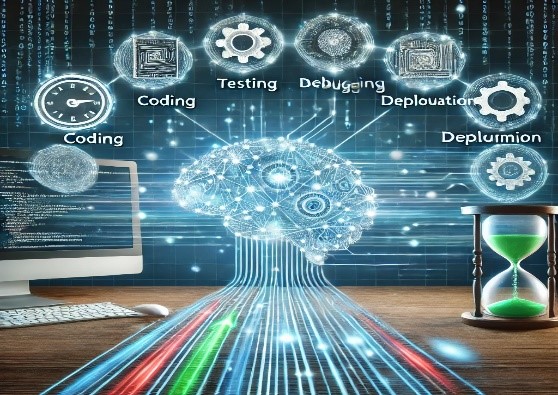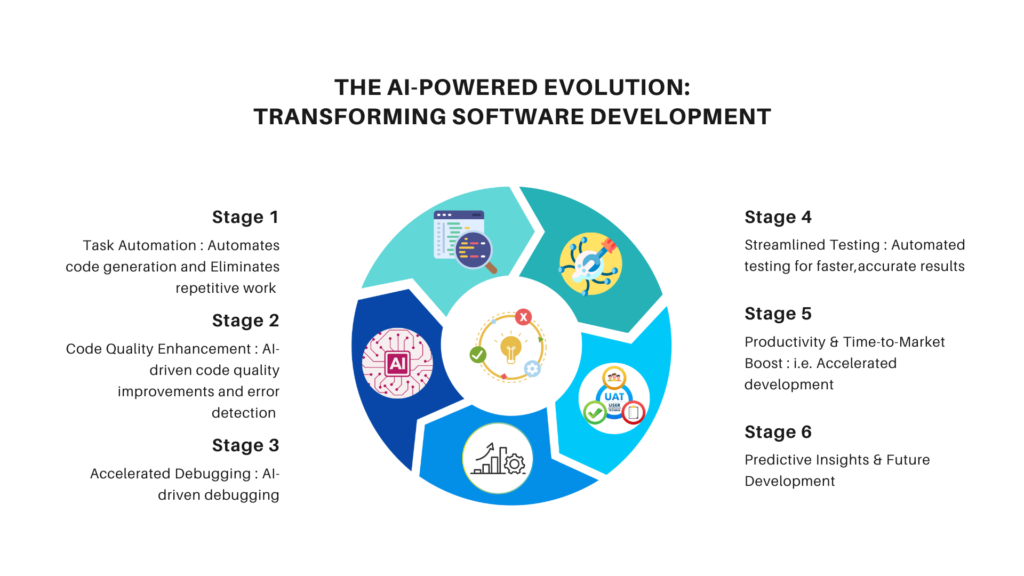Executive Summary:
This blog explores how AI automation is transforming software development, accelerating processes, improving code quality, and reducing manual effort. It highlights key benefits, implementation challenges, and the future potential of AI-driven development.
AI significantly enhances software development by automating repetitive tasks, improving code quality through intelligent analysis, accelerating debugging, and streamlining testing processes. For example, GitHub Copilot assists developers by generating code snippets, reducing time-to-market and increasing overall productivity.
Introduction:
The demand for rapid software development is at an all-time high as businesses strive to adapt to ever-changing market needs and technological advancements. Traditional software development approaches often face challenges such as long development cycles, human error, and resource constraints, which can slow down the delivery of new features and updates. As the complexity of applications increases, these challenges become even more pronounced, making it difficult for development teams to keep up with evolving requirements.
Enter Artificial Intelligence (AI), a transformative technology that is reshaping the software development landscape. AI has the potential to streamline various aspects of the development process, from writing and reviewing code to testing and deploying applications. By leveraging machine learning algorithms and advanced data analysis, AI can automate tedious tasks, identify patterns, and provide predictive insights that help developers work more efficiently and accurately. This paper explores how AI is driving a new era of productivity in software development, offering tools and solutions that enable teams to deliver high-quality software at a faster pace.

AI in software development –
Key Areas Where AI is Being Utilized:
AI is revolutionizing software development across several key areas. In code generation and review, AI tools assist developers by automatically generating code snippets based on contextual understanding, reducing the time spent on repetitive coding tasks and enhancing overall productivity. In bug detection and fixes, machine learning algorithms can analyze code and identify potential errors or vulnerabilities, enabling quicker resolutions and improved code quality.
Automated testing is another significant area where AI is making an impact. AI-driven testing frameworks can intelligently select and execute tests, reducing manual effort and increasing test coverage. In the realm of Continuous Integration and Continuous Delivery (CI/CD), AI optimizes deployment processes by predicting potential failures and streamlining workflows, allowing for more frequent and reliable releases. Lastly, in DevOps automation, AI facilitates collaboration and communication among teams, automating routine tasks and ensuring a smoother development lifecycle. Overall, AI integration is reshaping the software development landscape for the better.
AI in software development is rapidly evolving, with tools like GitHub Copilot enhancing coding efficiency through intelligent suggestions. While challenges like data privacy and integration persist, organizations are optimistic about AI’s potential to improve productivity, reduce costs, and accelerate time-to-market, shaping the industry’s future.

benefits of AI Automation in Software Development
The integration of AI automation in software development offers numerous benefits that significantly enhance the overall development process:
- Increased Speed and Efficiency:
AI-driven tools accelerate various stages of software development, from coding to deployment. Automated code generation and intelligent debugging reduce the time developers spend on repetitive tasks, enabling faster turnaround times for projects. By streamlining processes, teams can deliver features and updates more quickly, meeting market demands and enhancing customer satisfaction.
- Improved Code Quality and Reliability:
AI algorithms can analyze code in real-time, identifying potential errors, vulnerabilities, and performance bottlenecks before they become significant issues. By providing immediate feedback and suggestions for improvement, AI enhances code quality and reliability. This proactive approach minimizes bugs and reduces the likelihood of critical failures, ensuring that software performs optimally.
- Reduction in Manual and Repetitive Tasks:
Automation of routine tasks—such as code reviews, testing, and deployment—frees developers from monotonous work, allowing them to focus on more strategic and creative aspects of software development. This shift not only increases job satisfaction but also maximizes the utilization of skilled resources, leading to better outcomes.
- Better Collaboration and Productivity:
AI tools foster improved collaboration among team members by providing real-time insights and facilitating communication. Features like automated documentation and version control help maintain consistency across projects. As a result, teams can work more cohesively, sharing knowledge and resources, ultimately driving greater productivity and innovation in the development process.
Overall, AI automation is not just a technological advancement; it is a catalyst for transformation that empowers development teams to achieve higher levels of efficiency, quality, and collaboration.
Challenges in Implementing AI in Software Development
Despite its potential, implementing AI in software development comes with significant challenges. Training and adoption challenges often arise as teams must familiarize themselves with new tools and technologies, which can lead to resistance or slow adoption rates. Additionally, data requirements and privacy concerns pose hurdles, as AI systems depend on large datasets to function effectively, raising issues related to data quality, security, and compliance with regulations. Furthermore, ensuring seamless integration with existing workflows is critical; without proper alignment, AI solutions can disrupt established processes, resulting in inefficiencies rather than improvements. Addressing these challenges is essential for successful AI implementation.
Emerging Trends in AI for Software Development:
The landscape of software development is evolving with emerging trends like AI-driven DevOps, which enhances automation and collaboration. Additionally, natural language processing is improving code generation, while ethical AI practices are gaining importance to ensure transparency and fairness, fostering a more inclusive and responsible development environment.
Conclusion:
AI automation is revolutionizing software development by enhancing efficiency, improving code quality, and streamlining workflows. As organizations embrace AI-driven tools, they can overcome traditional challenges and adapt to rapidly changing demands. By focusing on ethical practices and continuous innovation, the future of software development will be defined by enhanced collaboration, productivity, and ultimately, superior software solutions that meet user needs.
